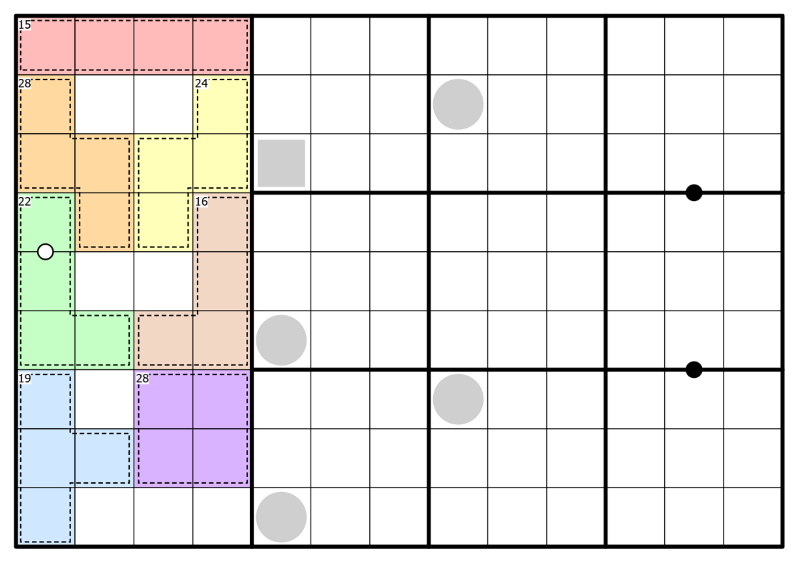Tetris
(Eingestellt am 3. September 2024, 17:32 Uhr von psninn)
The standard Sudoku rules apply.
Draw a loop made up of orthogonally adjacent cells in the grid.
The loop can't touch itself while traveling, not even diagonally.
Once the loop passes through a box, it can't go back again.
The loop must pass through cells with squares, circles, and those connected by black dots.
Cell with square should be filled with even digit, and circle with odd digit, and it also indicates how many cells are on the loop within that box.
The ratio of the two cells connected by black dots is 1:2.
The loop represents a region sum line, there is a same total within each box.
The seven Tetris blocks on the left can perfectly fit into the area surrounded by the loop.
The blocks can be rotated ,can't be flipped.
These Tetris also act as killer cages, where the numbers inside don’t repeat and sum up to a specified value.
The white dots in the cage connect two consecutive digits.
Click the image to play.↓↓↓

Here is some hints:
Draw a loop made up of orthogonally adjacent cells in the grid.
The loop can't touch itself while traveling, not even diagonally.
Once the loop passes through a box, it can't go back again.
The loop must pass through cells with squares, circles, and those connected by black dots.
Cell with square should be filled with even digit, and circle with odd digit, and it also indicates how many cells are on the loop within that box.
The ratio of the two cells connected by black dots is 1:2.
The loop represents a region sum line, there is a same total within each box.
The seven Tetris blocks on the left can perfectly fit into the area surrounded by the loop.
The blocks can be rotated ,can't be flipped.
These Tetris also act as killer cages, where the numbers inside don’t repeat and sum up to a specified value.
The white dots in the cage connect two consecutive digits.
Click the image to play.↓↓↓
Here is some hints:
The T-shaped Tetris is special.If you put the blocks on a chessboard, you’ll find that all the blocks except for the T will cover two black and two white squares, while the T will cover 3 + 1. This way, the direction of the loop in the box 6 can be quickly determined. Because the area surrounded by the loop can't have the same amount of black and white.
Lösungscode: R4
Zuletzt geändert am 6. September 2024, 04:30 Uhr
Gelöst von NEWS, vfig, zhangjinyang, Blake Saligia, yangduoxing, hajuyi, DylanRay
Kommentare
am 6. September 2024, 04:30 Uhr von psninn
added a hint
am 4. September 2024, 05:30 Uhr von NEWS
Wonderful Collaboration!

